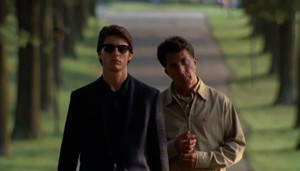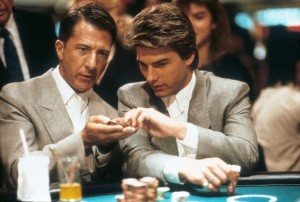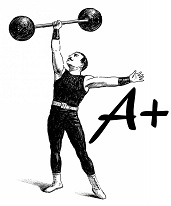Tom Cruise is one of Hollywood’s most renowned stars, garnering lavish praise for a 35-year career that began with him gyrating his underwear-encased buttocks in the 1983 film “Risky Business” (though not his debut, the film is recognized as his launching pad to stardom), to numerous starring roles as highly prominent and flamboyant characters; Maverick in “Top Gun,” Ethan Hunt in the “Mission: Impossible” series, and of course the titular Jerry Maguire and more recently Jack Reacher. In my opinion, his best roles have come when Cruise portrays the less extravagant and mild-mannered regular people thrust into impossible situations; Mitch McDeere in “The Firm” or Ray Ferrier in “War of the Worlds.”
One of, if not Cruises best performances, was also one of his earliest, as a 26- year-old self-centered narcissistic yuppie in Barry Levinson’s 1988 award-winning drama “Rain Man.” The highest grossing film of that year ($172 million), “Rain Man” also won four Oscar’s and was nominated for 8. It not only brought together two powerhouse stars in the young Cruise and the veteran Dustin Hoffman, but brought major awareness to those afflicted with Autism, which was still a relative unknown in the decadent and excessive decade of the 1980s. Director Barry Levinson and writers Barry Morrow and Ronald Bass took a highly unique premise and coupled it with legendary performances by Cruise and Hoffman (who are essentially the only characters on screen for the majority of the film) and turn out one of the greatest movies of all time.
Selfish and egotistical car dealer Charlie Babbitt (Cruise) has just imported four grey market Lamborghinis (oh how I love the 80s) in a great opening scene where the regal automobile is being lowered via crane against the backdrop of the smoggy LA skyline (with the Iko Iko song playing – you know this is just the beginning of an awesome movie). Due to threats from the EPA, Charlie is in danger of losing the cars and his $80,000 investment which will ultimately ruin him financially.

Though the deal is in peril, Charlie sets out for a planned vacation to Palm Springs with his girlfriend Susanna (Valerie Golino). En route, Charlie receives word that his wealthy and estranged father, Sanford Babbitt, has died. Charlie and Susanna abort the trip and fly to Charlie’s boyhood in Cincinnati. Charlie’s mother died when he was young, resulting in a strenuous relationship with his much older father. He tells Susanna the story of when he was 16, he took his father’s classic Buick Roadmaster convertible without permission. Sanford had him arrested and Charlie left home never to speak to him again. Susanna asks Charlie if the arrest was scary to which he confides that it was. He then remarks in reverent tone, “When I was a kid and I got scared the ‘Rain Man’ would come and sing to me,” explaining that the ‘Rain Man’ was an imaginary friend he had when he was a kid that disappeared when he grew up.
Charlie, believing he is the only heir to the 3$ million dollar estate, is dismayed when he learns his only inheritance will be his father’s prize winning rose bushes and the car that ultimately ended their relationship. An unknown beneficiary will be receiving the money. “Why should I be disappointed? I got a rose bush didn’t I? I got a used car didn’t I?” He screams at the lawyer. “If there is a hell sir, my father is in it and he is looking up right now and he is laughing his ass off.”
 Charlie, now angered over being cheated out of his birthright, begins an investigation into where the money is being funneled. He is brought to the Wallbrook Institution headed by Dr. Bruner (Jerry Molen), who was also a close friend of Sanford. Bruner drops a bomb on Charlie when he informs him the money has gone into the trust of his older brother, Raymond (Hoffman). Raymond is an autistic savant, and has been under Bruner’s care for over 20 years. Raymond is highly functioning and equipped with a superhuman memory and innate ability at mathematics, but is also the victim of quirks that prevent him from caring for himself.
Charlie, now angered over being cheated out of his birthright, begins an investigation into where the money is being funneled. He is brought to the Wallbrook Institution headed by Dr. Bruner (Jerry Molen), who was also a close friend of Sanford. Bruner drops a bomb on Charlie when he informs him the money has gone into the trust of his older brother, Raymond (Hoffman). Raymond is an autistic savant, and has been under Bruner’s care for over 20 years. Raymond is highly functioning and equipped with a superhuman memory and innate ability at mathematics, but is also the victim of quirks that prevent him from caring for himself.
Raymond adheres to a strict, though self-imposed routine that governs his every action; he must eat the same foods on a daily schedule at the same time and in the same manner. He must watch the same TV programs (“The Peoples Court” being his favorite that he must watch every day and also record the outcome in a notebook), and go to bed at the same time each night. Any break in this routine is devastating for Raymond and results in catatonic outbursts where he will scream and injure himself. Because of this, he obviously cannot reside outside of the care of Wallbrook.
Charlie covertly “abducts” Raymond from Wallbrook with the intent on flying him back to Los Angeles where he will begin a custody battle, though it is clear he could care less about the brother he had never known and is only interested in getting access to the money (since Raymond has no concept of money, if Charlie can gain custody he will have control of the funds). Susanna discovers the scheme and abandons Charlie in Cincinnati. The plan quickly backfires when Raymond has his first (of several) outbursts at the Cincinnati airport – reciting lists of airlines and plane crashes over the years and refuses to board the plane. Because of his antics, Charlie is forced to drive his brother from Ohio to California – a five day trip that slowly softens Charlie’s hardened shell and opens his heart for the first time in his life.

The brilliance of “Rain Man” is clearly the result of the acting. Hoffman is unforgettable as Raymond, playing a little child in a grown man’s body. You will get the impression of how this person lives his life confined to self-imposed barriers and hourly rituals that make up his entire world.
Though Hoffman would take the Oscar for ‘Best Actor,’ Cruise turns out a historic performance and anchors the entire film. He brings to life the conceited and self-centered character of Charlie – condescending and rude to his employee Lennie (Ralph Seymour) and his own girlfriend who obviously loves him a great deal – though due to his own fears and personal demons he will not let her in. Though Charlie comes from a wealthy family, it’s obvious he has taken none of his father’s advantages and has done everything in his life on his own. The money problems he encounters are realistic to everyone and while a substantial sum, certainly one that is not implausible.
The superbly written script will have you laugh and cry as you follow the story of the two brothers, strangers at first, on their cross country voyage, with Charlie harboring a decade of anger and resentment at his father and Raymond just along for the ride. The score is perfect, classic radio hits are interwoven with the haunting melody of Hans Zimmer; and though the movie is rated ‘R’ (due to some very minor language) it is a must watch and must own for everyone.
– by Matt Christopher



1 Comment
Right on excellent review